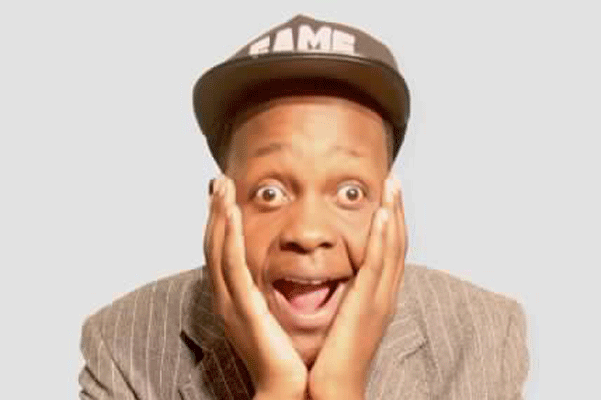
By Grant Moyo
Comedy is a way of life which is therapeutic for both the audience and comedians, says Zimbabwe-born stand-up comedian Learnmore Jonasi, aka Long John, casting hope on the psychological well-being of the society impacted severely by the disastrous impact of the coronavirus pandemic.
Guided by a concern to turn people’s despair to hope, he is taking full advantage of his prerogative to make sad souls laugh.
Raised by his grandparents in Chimanimani, Long John was born in Mutare. Although he was booed by the audience when he performed for the first time in 2012 at the Simuka Comedy Night hosted at Book Café in Harare, when he moved to Bulawayo in 2014 fellow comedian and founder of Umahlekisa Comedy Club, Ntando Van Moyo, provided him with stage time and honing skills to be a better comedian.
In the same year, he began his first international tour in South Africa at the Box Comedy Club hosted at Pop Art Theatre in Johannesburg.
In 2016, he was invited to perform at the African Comedy Festival at the Hippodrum Auditorium in Golders Green in the United Kingdom.
Driven by the love for laughter, it is while in the UK that he did a course with Laughing Horse to improve on his skills.
To date, he has been featured on comedy television shows like Mzansi Comedy Nights (Mzansi Magic), The Last Laugh with Stuart Taylor (Showmax), and Funny People Africa (Showmax).
- Chamisa under fire over US$120K donation
- Mavhunga puts DeMbare into Chibuku quarterfinals
- Pension funds bet on Cabora Bassa oilfields
- Councils defy govt fire tender directive
Keep Reading
Besides winning the People’s Choice Award at Steve Harvey’s Stand-Up Spotlight Competition (2019), his other notable awards include Pan African Comic of The Year at the South African Savannah Comics Choice Awards (2019) and two Outstanding Comedian of the Year accolades at the National Arts Merit Awards (2019 and 2020).
“Making people laugh is a backdrop to every story I tell. To me, comedy is everything that has the ability to take a person from any walk of life to a point of laughter. However, it all has to be ethical and professional, that’s how most comedians get away with making fun of anyone or anything. When I’m sharing my personal life, I will be intending to take people from whatever walk of life they may be in, to Long John’s crazy world with hopes that I bring a laugh. So comedy is not a job, it’s a lifestyle, I live and breathe comedy, it’s my way of life in the most literal sense,” Long John said.
The gifted comedian stressed that since the basis of every comic’s work is to make people laugh, there is a lot of intricacy that comes from formulation of ideas, expanding and eventually making the ideas come alive. He said the first audience he has before he performs any material is him.
He fluctuates from being the comedian to being a listener and he has to mask different audiences when he is doing that because people differ.
Long John also noted that in as much as his work sounds simple and straightforward, the process to go about it is tedious but enjoyable because he is operating from a place of passion.
“I create a friendly, tension-free environment of engagement using satire to talk about burning issues in a comic way. I basically make the unspeakable ‘SPEAK ABLE’ and make people loosen up a bit to speak it out. So, when I’m doing skits (short comic acts) I keep them short and sharp, it’s about the punch line and getting there quickly. No background information, no coherence, and no depth to it, ” he said.
“Firstly, it’s idea formulation, which is critical because that’s when a joke gets to be conceptualised, at this point the question is, what’s the punch line and the joke? Secondly, it’s idea expansion, focusing more on furthering and adding flesh to the punch line. This involves fattening the punch line with short insightful details that drive the skit to the punch line. Lastly, it’s idea fruition, this comes after the idea has been conceptualised and scripted. At this stage, it’s about acting out the idea implying necessary body language to weave it all together.”
With impressive one-man shows like The Longest Yard and The Village Boy, Long John pointed out that when performing, he uses a satiric approach where he talks about issues that people go through on a daily basis from politics to social injustices and religious matters.
He said he has a new act titled Happily Uneducated where he talks about how the Zimbabwean educational system needs to evolve and the necessity to change the way kids are educated by implementing a holistic approach that utilises their talents so as to cater for the non-academically gifted.
His language of delivery is mainly English with a few instances of Shona and phrases from various other languages.
“The main advantage of English is that it is widely accepted and spoken. However, it’s not necessarily fluency that cuts it, but rather delivering the joke that people can comprehend. I’ve performed around Africa with a lot of different comedians and I’ve noticed that our African languages are so powerful, be it Shona, Ndebele, Lunganda or Swahili.
“It’s amazing how comedians can easily relate with people when they speak their language and say something they can understand,” Long John said.
“Sometimes I don’t need to know a language fully, knowing a few popular phrases that I can incorporate within sets really get the people going. With my mother tongue, content flows easily and improvisations and impromptus are usually easy to come by, but with English sometimes I get constrained to stick within my set parameters, lest I steer too far away from my content such that I fail to navigate back smoothly.”
Given the already crippled entertainment industry due to instituted lockdowns to prevent the virus’ spread, Long John admitted that the crisis has furthered the importance of media in his career.
He does not need to be present to make people laugh; they can buy discs and still laugh in the comfort of their homes.
The comedian also hinted visibility on social media as helpful in getting work out.
He said his skits and sets reach a wider audience when put on social media platforms so much than he could even achieve by touring.
Giving an insight on how comedians are supported outside Zimbabwe, Long John described the United States as the epitome of what a typical entertainment industry should look like.
He said in the US effort is remunerated, whatever effort comedians put they are guaranteed of earning a living.
The stand-up comedian noted that it is the same case in the UK where comedy is a functioning discipline and there are institutions put in place to further it as a lucrative career.
He said in Nigeria comedy is mainly about keeping it local and bringing it closer to home as much as possible. Long John commended Nigerians for being very active on social media platforms and intentional about it, he said they know how to market and push their stuff on the digital space.
The outspoken comedian also applauded South Africa for having a certain level of camaraderie that exists within comedians, hinting that the comedians took it upon themselves to establish comedy institutions until the corporate world had a buy-in into their efforts.
He believes Zimbabwe can borrow and learn a lot from all these approaches.
Since the prohibition of audience interaction, Long John has gone virtual.
Plunged into uncharted territory, the stand-up comedian stressed that though adjusting to the new norm is a bold move, nothing substitutes the whole environment, mood and atmosphere of interacting with the audience.











